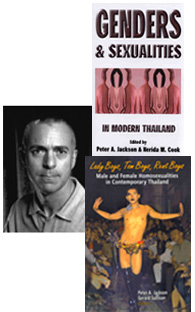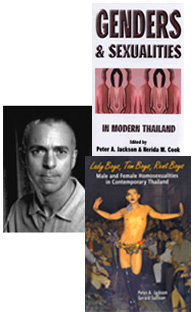Dr Peter A. Jackson is a Fellow in Thai cultural history in the Research School of Pacific and Asian Studies, Australian National University, Canberra and has authored numerous academic books on homosexuality in Thailand, Australia and other Asian societies such as Lady Boys, Tom Boys, Rent Boys; Multicultural Queer: Australian Narratives; Genders and Sexualities in Modern Thailand and Gay and Lesbian Asia: Culture, Community, Identity (publication date 2001).

æ: When did you realise you were gay? What was the process like?
peter: Even before puberty when I was still at Primary School I had a sense that I wasn't like other boys, and at the age of eight or nine I remember thinking that I did not want to get married and be like all the adult men that I saw around me. But I suppose the penny dropped when I was 12 or 13 and I started falling in love with other boys in my class in junior high school.
Even though I was always arranging to go on overnight hiking and camping trips with my school friends, and go on long drives into Sydney when we got older and got our driving licences, I never "did anything" at all at school. I suppose I was just too scared of the consequences of being found out. I had quite a few close girl friends at school too, but they wanted romance and I just wanted to be friends. I think some of them got quite confused when I never seemed interested in taking things further than going to parties and movies together.
æ: Are you out to family and friends? If yes, could you tell us something about it? Is it an important factor in your life?
peter: I finally came out at the end of undergraduate university when I was 21. I had been thinking I really needed to get out of my asexual rut for some time and then the first Sydney Gay and Lesbian Mardi Gras happened in 1978. The first Mardi Gras was a protest and lots of people got arrested by the police, and when I read about it in the newspaper the day after I felt so angry that I knew I had to do something to fight the homophobia that was keeping me afraid and in the closet. So I came out by getting involved in gay politics in Sydney, especially with the gay social group on campus at Sydney University.
I'm out to everyone now. My parents know, but they would rather not know. They never ask about my private life and I find it difficult to be open with them because they don't accept my sexuality. They are proud that I am the first person in my family ever to go to university let alone get a PhD and become a professional rather than a factory worker like all my other relatives, but they just can't deal with me being gay.
But being out is absolutely central to my life. I'm not very good at being a political activist but I seem to be able to write books and do academic research. I see my research and writing on gay and lesbian people's lives as my contribution to improving the situation for all of us. I put gay postcards on my office door, give lectures on gay and transgender culture and history at university and organise conferences on gay and lesbian Asia. Maybe it's not much, but those are the sorts of contributions that I seem able to make.
æ: Do you believe in monogamous or open relationships? Are you in one?
peter: I don't live by any fixed rules, but in general I don't think that emotional commitment requires 100 % sexual commitment. Monogamy is a heterosexual idea, and I think gay people need to design their own rules for living. That makes communication and understanding absolutely central for the success of any gay relationship. Sex, romance and friendship are not always the same thing, and sometimes we need to get each from a different person.
æ: What's your favourite CD?
peter: I'm very much into Moby at the moment. I'm listening to Moby's "Play" at lot.
æ: What kind of pet do you have? Why?
peter: I travel a lot, so no pet or pot plants that need constant attention.
æ: Have you ever encountered prejudice because of your gender/sexuality? How did you deal with it?

For a long time I gave up on my dream of getting a teaching job and slaved away in a boring job in the public service. In 1993 I happened to meet the famous gay academic Dennis Altman, who happened to have read my book and really liked it. He encouraged me to keep trying to get a university job and gave me the encouragement to keep trying. I finally got a job in a university in 1995 and I'm now doing more research on Thai gay and lesbian history.
æ: Do you work with/support any gay or lesbian community groups? How?
peter: Last year I helped set up the Asiapacifiqueer network. Asiapacifiqueer is an Australia-based network of mostly younger researchers doing work on queer issues in Asia and the Pacific. After all my negative experiences I wanted to do something to help other gays, lesbians and transgenders researching their own cultures and communities. Networking is very important to help keep morale up. We held our first conference during this year's Sydney Gay and Lesbian Mardi Gras and we will be holding our next event on Asian queer cultures and the Internet at the University of Queensland in December.
æ: What do you think we need most in Asia's gay and lesbian community?
peter: I'm a historian of gay and lesbian Thailand and I think what Asia's gay, lesbian and transgender communities need is a sense of their own histories. That there are generations of queer people who went before us all. There are lots of conservative homophobes in some Asian countries who say that being queer is either an imported Western perversion or that it amounts to a rejection of Asian cultural values. Those arguments are total rubbish are put around by old-fashioned moral dictators who can't stand anyone having their own opinion.
Every Asian society and culture has its own long history of people who didn't conform to heterosexual norms, and loved people of their own sex. But often those histories aren't written down -- they are kept as memories and we need to write those memories down to make sure they don't disappear. When we know the histories of Asian queer societies then people will see that queer Asians aren't copying some Western fad, but rather they are the inheritors of ancient homosexual Asian traditions that have often been repressed by generations of moral dictators.
æ: What advice would you give to someone who is trying to come to terms with his or her sexuality?
Remember that gay friends are more important than lovers. Many lovers become best friends. Don't judge your life by heterosexual standards. Every queer person wears an invisible badge of bravery for having rejected the pressures to conform. We all come out under fire, but like any good soldier victory is achieved by knowing when to advance and when to retreat.
Aprķs Interview
æ: Tell us something about your first sexual experience?
peter: He was twice my age and very kind and gentle. He introduced me to the gay scene and opened my eyes to a new world I was desperate to be part of. But we really had nothing in common, and so it did not last long. He was a like a gay older brother for those few months. I eventually found a boyfriend my own age.
æ: Which is sexier, mind or meat?
peter: Sex is such an immediate response thing, so the body and face are important for that. But romance often comes slowly and is only possible between two minds and spirits that click. That's the eternal tussle of gay relationships.
æ: Towel or tissue?
peter: Definitely towel, I hate those little pieces of tissue that cling to sticky places. Nothing beats the fresh smell of a soft, clean towel to smooth the re-entry to everyday consciousness after an intense erotic moment.
